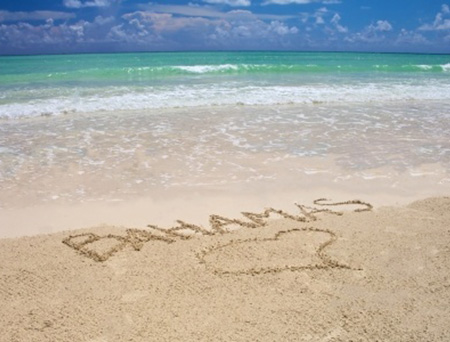Official name of the country, government structure
- The Commonwealth of the Bahamas
- Political system: constitutional parliamentary democracy (a constitutional monarchy)
- Head of the country: formally British Queen Elizabeth II represented by the Governor-General; the Prime Minister is the representative of political power
In the Commonwealth of the Bahamas, Elizabeth II is represented by the Governor-General and acts on the basis of recommendation by the government. She appoints the Prime Minister from the party that has won the election. Like the Queen, the Governor-General does not express her opinions or standpoints. The Governor-General is Dame Marguerite Pindling.
Administrative division – the Bahamas are divided into administrative districts. This applies to all areas in the country except for New Providence. There are 31 of them, out of which 23 were established in 1996, and the remaining ones in 1999.
Link to website of the government of the Commonwealth of the Bahamas: www.bahamas.gov.bs
History
The Caribbean Taino people moved into the Bahamas in the 7th century, probably from Haiti; they inhabited the entire archipelago by the 12th century. The first place that Christopher Columbus discovered in America was an island of the Bahamas archipelago. He landed in San Salvador in 1492 and declared it a Spanish dependency. The Spaniards took away most indigenous inhabitants to become slaves in gold mines in Cuba and Haiti; the rest of them died out. British people started to settle on the island at the beginning of the 17th century and in 1717 the Bahamas became a British colony. On 7 January 1964 the Bahamas were granted autonomy and independence was declared on 10 July 1973.
Information on Geography and Demography
- Position: the Caribbean, islands in the Atlantic Ocean, south-east of Florida and north-east of Cuba
- Area: 13,940 km2 (160th country in the world), out of which 28 % is water surface
- Capital city: Nassau (248,948 inhabitants)
- Population: 310,000 (175th country in the world)
- Highest point: Mount Alvernia (elevation of 63 metres)
- Density: 22 inhabitants / km² (186th country in the world)
- Religion: Baptists 35.4 %, Anglicans 15.1 %, Roman Catholics 13.5 %, Pentecostal 8.1 %, other Christians 24.2 %, other or no religion 3.7 %
- Time zone: UTC-5, summer UTC-4
- Currency: Bahamian dollar (BSD), 1 BSD = 100 cents
- Language: English (official), Creole (among Haitian immigrants)
- Ethnic structure: Afro-Bahamian (85 %), white (12 %), mixed (3 %)
Bank System
The capital of Nassau is among 10 most important global offshore destinations and the most important one in the western hemisphere. Most banks focus on private banking. Besides tourism, offshore banking is the second largest source of influx of money to the Bahamas.
More than 250 institutions holding bank licences operate in the Bahamas. Their business activities are regulated by “The Banks and Trust Companies Regulation Act”.
The offshore financial sector is extraordinarily large; it is 75 times higher than the GDP of the Bahamas. Most offshore transactions concern mediation of operations between foreign entities.
Current information holds that more than 400 banks and financial institutions operate in the Bahamas, e.g. Barclays Bank, Royal Bank of Canada, Bank of The Bahamas, Citibank, Commonwealth Bank, Fidelity Bank, Finance Corp of Bahamas, First Caribbean Intl Bank, Scotiabank, Ansbacher, Bank of Nova Scotia Trust Co, Bank of the Bahamas Trust, Butterfield Bank, CIBC Trust, Cititrust, Fidelity Merchant Bank, Latin American Investment Bank Bahamas, Pictet Overseas Trust Corp, Royal Bank of Canada, SG Hambros Bank, UBS Trustees, etc.
Tax System
The Bahamas are a tax haven, and there are many related opportunities permitted by laws of the home country for European companies and individuals. Among the most important investment tools are offshore holdings, which serve both tax and non-tax purposes. The most frequent one is protection of profit against taxation. A holding with its registered office in the Bahamas cannot make use of advantages arising out of agreements preventing double taxation as the Bahamas are not a signatory of any such agreement; however, shareholding centralisation brings about administrative simplification and potential savings.
VAT of 7.5 % was introduced in the economy of the Bahamas on 1 January 2015.
Investment
Due to their geographic proximity, besides other reasons, the United States are the main investor in the Bahamas. In 2012, the total amount of direct foreign investment was USD 595 million.
The Bahamas are a tax haven and therefore, the financial sector is one of two pillars of the Bahamian economy.
The Bahamas are open to a foreign investment influx and offer a number of investment incentives. The main reasons for investment in the Bahamas are the proximity of the USA and the same time zone. The Bahamas are a democratic country with stable legislation, high-quality public services and a modern infrastructure. There is no capital profit tax, inheritance tax, taxation of legal or physical entities, dividends or interest.
The Bahamas Investment Authority (BIA) operates within the office of the Prime Minister and its task is to develop the Bahamian investment policy, support investment, evaluate proposals of projects, monitor projects and support their realisation. All projects need to be submitted to the BIA for approval.
Among the laws regulating legislative incentives for investors are the following:
The Hotels Encouragement Act (allows hotel developers to enjoy relief concerning duty on construction material and other equipment as well as real estate tax relief for up to 20 years), the Industries Encouragement Act (provides exporters with relief concerning duty on the import of material and equipment as well as fees for their licence), the Export Manufacturing Industries Encouragement Act, the Bahamas Free Trade Zone Act and the Agricultural Manufactories Act.
Free Trade Zones
In the territory of the island of Grand Bahama there is a free trade zone called Freeport, the area of which is 230 square metres. This free zone was established in 1955 and comes under the Grand Bahama Port Authority (GBPA), which is the main provider of services within the GBPA. Here, companies do not pay income tax, capital profit tax, profit tax, inheritance tax, tax on gifts or imported or exported goods.
Relations of the Country with the EU
There is no resident embassy of any EU membership country in the Bahamas.
In 2008 the Bahamas and other Caribbean countries signed the Economic Partnership Agreement (EPA) with the EU, which establishes a legal regime of the Free Trade Agreement between the EU and 15 Caribbean countries, where the EU is the second biggest business partner after the USA.
Commercial and Economic Cooperation with the Czech Republic
Contractual basis between both countries
Supplementary Convention on Civil Court Proceedings between the Czechoslovak Republic and the United Kingdom of Great Britain and Northern Ireland of 1935
- Agreement between the Czechoslovak Republic and the United Kingdom of Great Britain and Northern Ireland on Mutual Extradition of Criminals amended by the Protocol signed in London on 4 June 1926.
- Agreement between the Czechoslovak Republic and the United Kingdom of Great Britain and Northern Ireland on Legal Assistance in Civil Matters of 1924.
- On 6 March 2014 the Czech Republic and the Commonwealth of the Bahamas concluded the Agreement on Exchange of Tax-Related Information at the Ministry of Foreign Affairs and Immigration of the Commonwealth of the Bahamas; this agreement took force on 2 April 2015.
Local Customs Important for Business Contacts
Business people wear formal and conservative stylish clothes; it is acceptable for women to wear a classical-style trouser suit.
Official language: English
Working hours:
- Ministries and companies: Mon – Fri: 9 a.m. – 4 p.m.
- Shops: Mon – Sat: 10 a.m. – 5 or 6 p.m.
Conditions for Czech Nationals and EU Citizens Using Local Health Care
Health care for the nationals of the Czech Republic is not regulated on a contractual basis.
There are two state-owned hospitals, on the island of New Providence/Nassau and on Grand Bahama. There are state-owned clinics on New Providence, Grand Bahama and Out Islands. Health care must be paid for. For this purpose, there are local and international insurance companies in the Bahamas.




